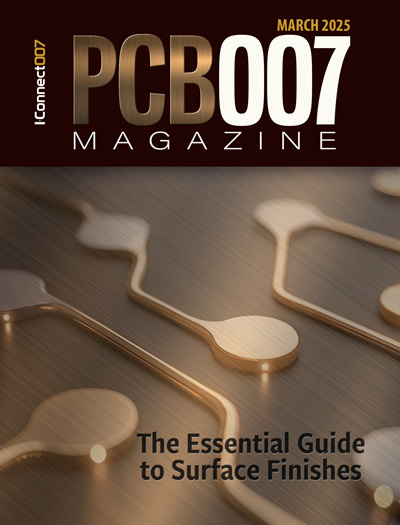-

- News
- Books
Featured Books
- pcb007 Magazine
Latest Issues
Current Issue
In Pursuit of Perfection: Defect Reduction
For bare PCB board fabrication, defect reduction is a critical aspect of a company's bottom line profitability. In this issue, we examine how imaging, etching, and plating processes can provide information and insight into reducing defects and increasing yields.

Voices of the Industry
We take the pulse of the PCB industry by sharing insights from leading fabricators and suppliers in this month's issue. We've gathered their thoughts on the new U.S. administration, spending, the war in Ukraine, and their most pressing needs. It’s an eye-opening and enlightening look behind the curtain.

The Essential Guide to Surface Finishes
We go back to basics this month with a recount of a little history, and look forward to addressing the many challenges that high density, high frequency, adhesion, SI, and corrosion concerns for harsh environments bring to the fore. We compare and contrast surface finishes by type and application, take a hard look at the many iterations of gold plating, and address palladium as a surface finish.
- Articles
- Columns
Search Console
- Links
- Media kit
||| MENU - pcb007 Magazine
Linkage Technologies Ready for ‘China Plus One’
August 21, 2023 | Andy Shaughnessy, I-Connect007Estimated reading time: 6 minutes
I recently spoke with Mehul Davé and Michael Schumacher of Linkage Technologies. In this interview, they discuss their acquisition of a PCB facility in Malaysia, their global expansion plans, and how Linkage stands to benefit as companies begin pursuing the China Plus One sourcing strategy.
Andy Shaughnessy: Mehul, why don't you give us a quick background on the company, and then we'll talk about some more recent developments.
Mehul Davé: Sure. So, let’s go back a little way. Mike and I met when he was a customer of Cimnet at a company in Minneapolis, where Mike is based. I've known Mike for about 30 years. He eventually started an Asia PCB sourcing business at Coretec which over time morphed into Viasource that became part of TTM. Mike left TTM in 2015, and a couple of years later, we ended up acquiring Viasource from TTM, which was really good for both parties, actually. And since then, we've been growing quite a bit.
From a higher level, we are not just a sourcing business, but there are actually three legs to our stool. The first leg is the sourcing business, where we target mid-sized EMS and OEM companies that don't have the bandwidth to have their own supply chain people spinning in Asia. Obviously, large companies have that capability, and they probably wouldn't look to us to help them out. We target companies that want to get the advantage of Asia’s service, pricing and delivery, all of that. We have amazing engineering and customer service. We have people in Asia who go to the factories and do the inspections. We hold the customer’s hand through the whole process, all the way through delivery, and even if there are problems after delivery.
The second leg of the stool is direct sales, where some very large companies are going to want to deal directly with the factory. However, the factories don't have the connections and contacts here. So over 30-plus years of being in this business, we've developed some really good contacts; we basically act as a sales rep to those factories in Asia, and we provide some of the services and most importantly engineering capabilities.
The third leg began about two years ago. We saw the geopolitical problems happening in Taiwan, and we decided we should really have an additional steady source of circuit boards from Southeast Asia. So, we embarked on this plan to acquire Spectrum Technologies, a board shop in Malaysia. That's why Mike is in Malaysia right now, helping get them off the ground and rolling. So those are the three legs of the stool, and those segments are all growing well for us right now. They complement each other. That's a very high-level look at what we do.
Shaughnessy: Mike, tell us a little about what you're doing in Asia right now.
Michael Schumacher: There’s a new wave in the industry happening now. The first wave was the shift from North America to China. Mehul and I both lived through that, prior to the year 2000, when significant numbers of U.S. PCB shops closed or got bought out and moved to China. We were on the software side of things. And then I joined Coretec, which became DDI, which became Viasystems, which became TTM. And we started phase two of the wave and we rode that wave. Then, in 2015, we started Linkage Technologies, and that business is doing well and growing. But a couple of years ago, we sensed another wave because companies were becoming uncomfortable having so much of their business in China and Taiwan. There are a lot of really great shops in those places, and we have really strong partners there.
But with everything that's happening right now, geopolitically, and otherwise, I think there's a real movement among companies to diversify. It’s interesting. Here in Malaysia, we've been entertaining new customers. One major new customer describes their strategy as China Plus One. They're not leaving China, for sure. But they're diversifying and getting sources ready outside of China and Taiwan. We saw that coming. At almost every sales visit, I was asked, “Are you guys planning to do anything outside of China and Taiwan?”
We did a lot of searching. We ran across a factory opportunity in Malaysia called Spectrum Technologies. We bought Spectrum and took over in April 2022. The company has been around since 2010, but I think they lost money literally every month of their existence. But they had a really loyal customer base in the burn-in board and semiconductor businesses.
We’re located in Johor Bahru, just across the river from Singapore. If you leave here later at night when the traffic has died down, you can get to the Changi Airport within an hour. Our intention at Spectrum is to develop it into a quickturn prototype and mid-sized volume production option for customers who are looking for a non-China Southeast Asia solution. There's a lot of contract manufacturing business here, and our burn-in board and semiconductor customers as well.
Spectrum is, I would say, a surprisingly capable group of people with a 54,000 square-foot factory that can do 2-32 layers. Right now, it's all through-hole technology and rigid circuit boards. But Spectrum gives us a ready-made base to expand from; the company came with all the licenses and UL certifications. We've spent the last year revamping the business, somewhere in the neighborhood of $3 million on this whole deal and including a pretty substantial investment in equipment. For example, today, we just got a brand new line that will enable us to get in the neighborhood of 3.5 mil lines and spaces.
We have a new automated bareboard testing machine, and we just bought a new AOI machine. This was the month for our new COO John Wong, who's a highly capable guy coming from the PCB industry locally. We noticed at our employee meeting that we only have three people on staff who are non-Malay. The whole team is local Malay, except for me and two other guys. It's been a really interesting ride. And based on what we see here, we think we have our surfboard in the water waiting for the wave, and depending on what happens, it could be a substantial wave.
Shaughnessy: Timing is everything, right? It’s handy that you all offer options in the same neighborhood, outside of China and Taiwan.
Davé: Yes, I think our plan has been validated. TTM is building a huge facility in Malaysia. A lot of people are targeting Thailand too, so we know we are on the right track. Obviously, with everything that's happened since then, we feel like we were the first ones to the dance.
Schumacher: There's a coming shift to in the supply chain, which is going to help us a lot. You know, right now, most of our base laminate material and prepreg come from China and Taiwan. But all of those material suppliers are building facilities in Thailand to support these new factories. More than 20 major PCB companies are relocating or building facilities in Thailand and Malaysia. So, while those guys are getting going, we already have our factory going. We think we're ahead of the game.
Davé: I just want to emphasize that we're not leaving China. We have a great team in China that is going to continue as our supplier base, and the same is true for Taiwan. We’re just adding another culturally stable supply source to our customer base. It’s China Plus One.
Shaughnessy: Is there anything else that you I want to mention? Anything we haven't talked about?
Schumacher: I just think that we have a really strong solution now. We're putting the company into a sustainable position where we've got multiple options. We have a really strong team in India and we're just finishing the ERP system for our factory. I think that's going to differentiate us. We've also got a really great team in North America that's doing a bang-up job supporting the customer.
Shaughnessy: Very good. Thanks for meeting with me.
Davé: Thank you, Andy.
Suggested Items
Global Citizenship: Cultivating Cross-border Partnerships With Integrity
06/11/2025 | Tom Yang -- Column: Global CitizenshipWith rising geopolitical pressures, cross-border partnerships are essential for businesses looking to expand their reach, enhance innovation, and drive sustainable growth. However, these partnerships thrive only when founded on trust and transparency. Otherwise, even the most promising collaborations can quickly unravel, leading to financial losses and reputation damage.
Enough Talk—Time to Strengthen America’s Microelectronics Industrial Base
06/09/2025 | James Will, USPAEThe U.S. doesn’t have an innovation problem in terms of microelectronics, or a talent problem or even an investment problem. What the U.S. has is a coordination problem, and that’s threatening the livelihood of our domestic microelectronics ecosystem.
IDC Decreases its Worldwide Smartphone Forecast to 0.6% for 2025 Amidst Uncertainty and Tariff Volatility
06/03/2025 | IDCWorldwide smartphone shipments are forecast to grow 0.6% year-over-year (YoY) in 2025 to 1.24 billion units, according to the International Data Corporation (IDC) Worldwide Quarterly Mobile Phone Tracker.
NVIDIA Expected to Launch RTX PRO 6000 Special Edition for China’s AI Market, Potentially Boosting Future GDDR7 Demand
05/28/2025 | TrendForceTrendForce reports that following the new U.S. export restrictions announced in April—which require additional permits for the export of NVIDIA’s H20 or any chips with equivalent memory bandwidth or interconnect performance to China—NVIDIA is expected to release a special low-power, downscaled version of the RTX PRO 6000 (formerly B40) for the Chinese market.
Global NEV Sales Top 4 Million in 1Q25; BYD Remains Dual Leader, Xiaomi Enters Top 10 in BEV Segment
05/21/2025 | TrendForceTrendForce’s latest reports reveal that global NEV sales—including BEVs, PHEVs, and FCEVs—reached 4.02 million units in the first quarter of 2025, marking a 39% YoY increase. NEVs accounted for 18.4% of total global auto sales for the quarter.


